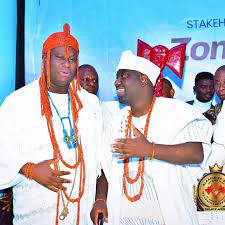Moses Olafare, the Spokesperson for Ooni of Ife, Oba Enitan Ogunwusi, has explained the reasons why the monarch will not react to the 48-hour threat by the Alaafin of Oyo, Oba Abimbola Owoade, to reverse the title conferred on a popular Ibadan-based business mogul, Dotun Sanusi.
Olafare, in a Facebook post on Tuesday, disclosed that Oba Ogunwusi had particularly directed him to ignore the revered Oyo monarch.
According to him, the Ooni will not dignify what he described as “undignifyable” with an official response, stressing that he had left the matter to be handled in the public court of opinion.
He wrote, “My principal has directed me against issuing a press release on the empty threat. I beg to disappoint you, gentlemen of the press.
“We can not dignify the undignifyable with an official response. We leave the matter to be handled in the public court of opinion, as it is already being treated.
“Let’s rather focus on narratives that unite us rather than the ones capable of dividing us. No press release, please. 48 hours my foot!”
Oba Owoade described the Ooni’s action as an “affront” after he issued a 48-hour ultimatum for the revocation of the chieftaincy title.
He also claimed it was a direct challenge to his authority.
The Alaafin of Oyo, Oba Abimbola Akeem Owoade, has given the Ooni of Ife, Oba Enitan Adeyeye Ogunwusi, a 48-hour ultimatum to revoke the Okanlomo of Yorubaland chieftaincy title recently conferred on Ibadan business tycoon, Engineer Dotun Sanusi.
In a statement on Monday signed by his Director of Media and Publicity, Bode Durojaiye, the Alaafin described the Ooni’s action as an “affront.”
He also claimed it was a direct challenge to his authority.
The Alaafin reiterated that he holds the exclusive right to bestow titles that cover the entire Yorubaland.
“The conferment of a Yoruba-wide chieftaincy title by the Ooni is not only ultra vires but an insult to the Titan of Yorubaland.
“The Supreme Court itself has ruled that only the Alaafin has such authority. Yet, the Ooni continues to act above the law, trampling on both tradition and the courts.”
The Alaafin warned that if the Ooni fails to withdraw the title within 48 hours, “consequences will follow.”
Recall in 1991, a similar occurrence happened when the late Alaafin, Oba Lamidi Adeyemi, wrote to the military governor of Oyo State, Colonel Abdulkareem Adisa, to inform him about an aberration by the late Ooni, Oba Okunade Sijuade, of conferring an imaginary chieftaincy title of Akinrogun of Yorubaland on the National Chairman of the National Republican Convention, Chief Tom Ikimi.
Oba Adeyemi described Oba Sijuade’s action as an outright desecration of the sacred institution, especially when such abuses come from quarters that are expected to protect and embellish such institutions.
FOLLOW US ON:
FACEBOOK
TWITTER
PINTEREST
TIKTOK
YOUTUBE
LINKEDIN
TUMBLR
INSTAGRAM






































